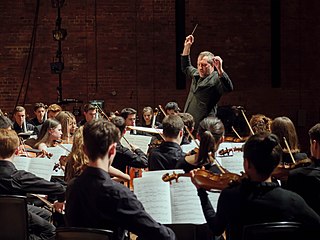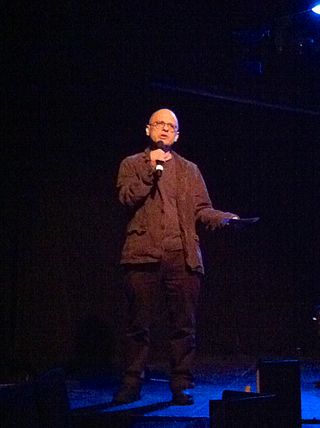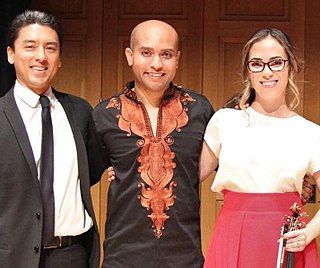Related Research Articles

Esa-Pekka Salonen is a Finnish conductor and composer. He is the music director of the San Francisco Symphony and conductor laureate of the Los Angeles Philharmonic, Philharmonia Orchestra in London and the Swedish Radio Symphony Orchestra.

Julia Wolfe is an American composer and professor of music at New York University. According to The Wall Street Journal, Wolfe's music has "long inhabited a terrain of its own, a place where classical forms are recharged by the repetitive patterns of minimalism and the driving energy of rock". Her work Anthracite Fields, an oratorio for chorus and instruments, was awarded the 2015 Pulitzer Prize for Music. She has also received the Herb Alpert Award (2015) and was named a MacArthur Fellow (2016).

Thomas Joseph Edmund Adès is a British composer, pianist and conductor. Five compositions by Adès received votes in the 2017 Classic Voice poll of the greatest works of art music since 2000: The Tempest (2004), Violin Concerto (2005), Tevot (2007), In Seven Days (2008), and Polaris (2010).

David Lang is an American composer living in New York City. Co-founder of the musical collective Bang on a Can, he was awarded the 2008 Pulitzer Prize for Music for The Little Match Girl Passion, which went on to win a 2010 Grammy Award for Best Small Ensemble Performance by Paul Hillier and Theatre of Voices. Lang was nominated for an Academy Award for "Simple Song #3" from the film Youth.
Bang on a Can is a multi-faceted contemporary classical music organization based in New York City. It was founded in 1987 by three American composers who remain its artistic directors: Julia Wolfe, David Lang, and Michael Gordon. Called "the country's most important vehicle for contemporary music" by the San Francisco Chronicle, the organization focuses on the presentation of new concert music, and has presented hundreds of musical events worldwide.

Michael Gordon is an American composer and co-founder of the Bang on a Can music collective and festival. He grew up in Nicaragua.

Gerald Barry is an Irish composer.
Christopher Chapman Rouse III was an American composer. Though he wrote for various ensembles, Rouse is primarily known for his orchestral compositions, including a Requiem, a dozen concertos, and six symphonies. His work received numerous accolades, including the Kennedy Center Friedheim Award, the Grammy Award for Best Classical Contemporary Composition, and the Pulitzer Prize for Music. He also served as the composer-in-residence for the New York Philharmonic from 2012 to 2015.

Gabriel Kahane is an American composer and singer-songwriter.
Anna Clyne is an English composer, now resident in New York City, US. She has worked in both acoustic music and electroacoustic music.
Tevot is a one-movement symphony for orchestra by the British composer Thomas Adès. The work was commissioned by the Berlin Philharmonic and Carnegie Hall. The world premiere was given by the Berlin Philharmonic under the direction of Simon Rattle at the Berliner Philharmonie on February 21, 2007. The United States premiere was given by the same ensemble at Carnegie Hall on November 14, 2007.
Naive and Sentimental Music is a symphonic work by American composer John Adams. The title of the work alludes to an essay by Friedrich Schiller, On Naïve and Sentimental Poetry, that contrasts a creative personality that creates art for its own sake versus one conscious of other purposes, such as art’s place in history. The composer cites both the slowly developing harmonies of Bruckner's Fourth Symphony and the atmosphere of the Sonoma coastline as inspirations for the work. The piece was co-commissioned by the Los Angeles Philharmonic, the Ensemble Modern, the Vancouver Symphony Orchestra, and the Sydney Symphony Orchestra. It received its first public performance by the Los Angeles Philharmonic conducted by Esa-Pekka Salonen on February 19, 1999. A recording by Salonen and the Los Angeles Philharmonic was subsequently released by Nonesuch Records.

Derrick Skye is a composer, conductor, musician, and educator based in the Los Angeles area who often integrates musical practices from cultures around the world in his works. The Los Angeles Times has described Skye's music as "something to savor" and "enormous fun to listen to." The Times (London) described Skye’s music as “deliciously head-spinning.”
The Second Concerto for Orchestra is a concerto for orchestra by the American composer Steven Stucky. The work was commissioned by the Los Angeles Philharmonic while Stucky was their composer-in-residence for the inaugural season of the Walt Disney Concert Hall. It was completed in 2003 and was first performed on March 12, 2004, with the conductor Esa-Pekka Salonen leading the Los Angeles Philharmonic. The piece was awarded the 2005 Pulitzer Prize for Music.
L.A. Variations is an orchestral composition by the Finnish composer Esa-Pekka Salonen. The work was commissioned by the Los Angeles Philharmonic, of which Salonen was then music director. It was first performed at the Dorothy Chandler Pavilion in Los Angeles, on January 16, 1997, with Salonen conducting the Los Angeles Philharmonic. The piece is dedicated to the orchestra, about which Salonen remarked, "I wrote LA Variations specifically for the players of the Los Angeles Philharmonic. I'm very proud of the virtuosity and power of my orchestra."
Soundings is a single-movement orchestral composition by the American composer John Williams. It was commissioned by the Los Angeles Philharmonic for the inaugural season of the Walt Disney Concert Hall. It was first performed on October 25, 2003, by the Los Angeles Philharmonic under the direction of Williams.
Steel Hammer is a 2009 composition for three sopranos and chamber ensemble by the American composer Julia Wolfe. It was first performed on November 21, 2009, at Zankel Hall by the contemporary classical music groups Bang on a Can and Trio Mediæval. The piece is based on the ballad of the African-American tall tale John Henry. The composition was a finalist for the 2010 Pulitzer Prize for Music.
Sculpture is an orchestral composition by the Finnish composer Magnus Lindberg. The music was commissioned by the Los Angeles Philharmonic with support from the Koussevitzky Music Foundation to celebrate the orchestra's inaugural season at the Walt Disney Concert Hall. Its world premiere was given by the Los Angeles Philharmonic under the direction of Esa-Pekka Salonen on October 6, 2005.
Vista is a composition for orchestra written by the Finnish composer Kaija Saariaho. The work was commissioned by the Berlin Philharmonic, the Helsinki Philharmonic Orchestra, the Los Angeles Philharmonic, and the Oslo Philharmonic. The world premiere took place at the Helsinki Music Centre on 12 May 2021 and was performed by the Helsinki Philharmonic Orchestra led by the conductor Susanna Mälkki, to whom the piece is dedicated.
Yanga is a composition for choir, percussion quartet, and orchestra written in 2019 by the Mexican composer Gabriela Ortiz with a text by Santiago Martin Bermúdez. The work was commissioned by the Los Angeles Philharmonic for the ensemble's centennial celebrations. Its world premiere was given by the Tambuco Percussion Ensemble, the Los Angeles Master Chorale, and the Los Angeles Philharmonic conducted by Gustavo Dudamel at the Walt Disney Concert Hall on October 27, 2019.
References
- 1 2 3 Wolfe, Julia (2020). "Flower Power". Julia Wolfe Music. Retrieved June 4, 2023.
- ↑ Swed, Mark (January 20, 2020). "Review: Los Angeles Philharmonic premieres Julia Wolfe's "Flower Power"". Los Angeles Times . Retrieved June 4, 2023.
- ↑ James, Falling (January 23, 2020). "Julia Wolfe Reinvents the '60s With Brave New Sounds in Flower Power". LA Weekly . Retrieved June 4, 2023.
- ↑ Smith, Adrian (March 1, 2020). "New Music Up a Notch". The Journal of Music . Retrieved June 4, 2023.